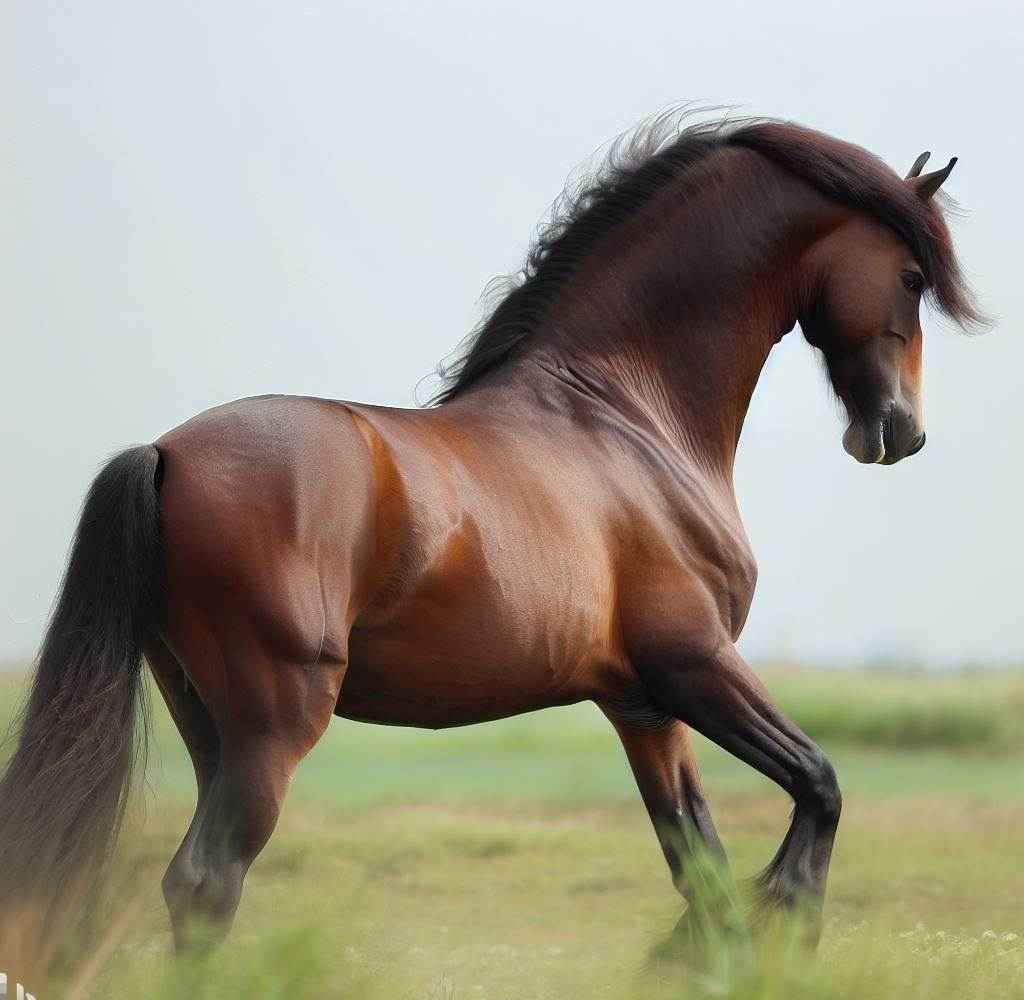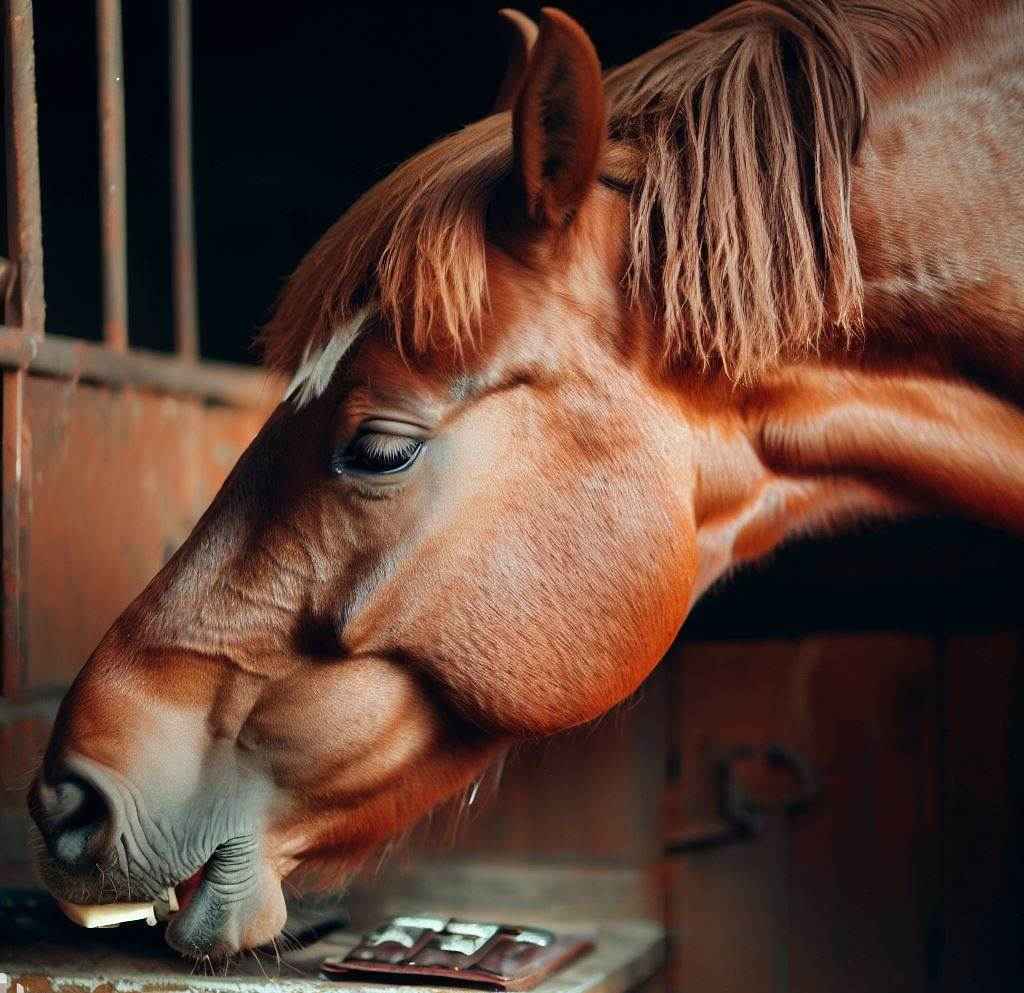Can Horses Eat Chocolate?
Can Horses Eat Chocolate? Horses should not consume chocolate. Because of their delicate digestive systems and theobromine’s propensity to cause significant disease and even death in big amounts. The question of whether horses can eat chocolate is a resounding no. Chocolate is a beloved treat for humans which poses significant dangers to our equine friends. Horses have a sensitive digestive system and chocolate contains theobromine a substance they cannot metabolize effectively.
This compound is also found in caffeine that can lead to toxic reactions in horses and potentially causing severe health issues. The chocolate is high in sugar and fat which can disrupt the delicate balance of microflora in a horse’s gut which leads to gastrointestinal problems like colic or diarrhea. Additionally, indulging in chocolate can contribute to weight gain and obesity in horses by leading to various health concerns in including laminitis.
While your horse may give you those pleading eyes when you are enjoying a chocolate bar so it is crucial to resist the temptation and opt for safer treats. Carrots, apples or peppermints are delightful alternatives that horses love and wont not harm their health. When it comes to chocolate and horses so, is best to keep these two worlds apart. Chocolate may be a treat for us but for horses and it is a potential health hazard that should be strictly avoided.
Introduction:
In the realm of equine dietary restrictions there is a common understanding that certain foods are off-limits for our four-legged friends. But what about chocolate? We humans adore it, but is it safe for horses to indulge in this sweet delight? In this blog post, we will delve into the world of equine nutrition to answer the intriguing question Can horses eat chocolate?
Can Horses Eat Chocolate Cake & Biscuits?
In moderation most things are safe. On your horse’s birthday, a small piece of cake is unlikely to be harmful, as most horses are gluttons who don’t care much for cake. Horses should never be given chocolate cake or biscuits. These sweet treats while tempting for humans can be detrimental to a horse’s health. Chocolate is a key ingredient in these goodies that contains theobromine which is toxic to horses.
Horses lack the necessary enzymes to process theobromine efficiently by making even small amounts of chocolate cake or biscuits potentially harmful. Aside from the theobromine content the chocolate cake and biscuits are typically high in sugar, fats, and artificial additives. Excess sugar and calories in horse treats can disrupt the digestive system which potentially causing colic or diarrhea and contribute to weight gain and obesity, potentially leading to severe health issues like laminitis.
When it comes to treating your equine companion and it is essential to choose safe and healthy options. Instead of chocolate-laden sweets by consider offering your horse horse-friendly treats like carrots, apples, or specially formulated horse treats. These alternatives not only ensure your horse’s safety but also provide them with the necessary nutrition for their health and happiness, emphasizing the importance of prioritizing their well-being over their sweet tooth.
Types Of Chocolate Horses Eat?
Horses should not be given any type of chocolate, as it’s generally toxic to them. Chocolate contains theobromine a compound that horses cannot effectively metabolize due to their unique digestive system. Theobromine can lead to severe health issues when ingested by horses in including toxicity and gastrointestinal problems.
The various types of chocolate, whether it’s dark chocolate, milk chocolate, white chocolate or any other variation they all contain theobromine to varying degrees. None of these chocolate types are safe for equines and attempting to distinguish which is less harmful is not recommended. To keep horses healthy and out of harm’s way it is crucial to avoid feeding them any form of chocolate. Instead, opt for horse-friendly treats like carrots, apples or specially designed equine treats.
These alternatives not only spare your horse from potential health risks but also provide them with nutritious snacks that align with their dietary needs. When it comes to chocolate and horses the rule is simple as question is can horses eat chocolate is None. Chocolate in all its forms should never be offered to horses as it can have harmful consequences on their health and well-being.
Do Eating Chocolates Horses Got Problems?
Yes, eating chocolates can indeed cause significant problems for horses. Chocolate contains theobromine a compound that is toxic to horses. Unlike humans who can metabolize theobromine effectively, horses lack the necessary enzymes to process it. When horses consume chocolates then theobromine can accumulate in their system that leads to a range of health issues. Through their hay horses take in a lot of sugar but too much sugar can lead to a range of health issues.
The primary issue is weight gain which can be bad for a horse’s overall health. The right weight for the horse’s size must be maintained since overfeeding sugar can also cause metabolic issues, colic and chronic inflammation. One of the primary problems associated with horses eating chocolate is toxicity. Theobromine toxicity can cause restlessness, increased heart rate, muscle tremors, seizures and even death in severe cases like necessitating immediate veterinary intervention. In addition to toxicity the chocolate can also disrupt a horse’s digestive system.
High sugar and fat content in chocolate can cause gastrointestinal issues like colic and diarrhea, while excessive consumption can lead to weight gain and obesity in horses by causing health complications like laminitis. Feeding chocolates to horses is a dangerous practice that can lead to theobromine toxicity, digestive issues, and obesity. To ensure the health and well-being of your equine companions this is vital to keep all forms of chocolate out of their reach and provide them with safe and horse-friendly treats instead.
Facts & Features Of Horses:
Horses are magnificent creatures with a rich tapestry of facts and features that have fascinated humans for centuries. Here are some intriguing aspects of these equines:
- Horses come in various breeds, each with its unique characteristics.
- From the elegant Arabian to the powerful Clydesdale, there’s a horse breed for nearly every purpose and preference.
- Horses are renowned for their speed.
- The fastest recorded speed for a horse is around 55 miles per hour, achieved by the Thoroughbred breed during a sprint.
- Horses are herbivores, primarily feeding on grasses and plants.
- Their digestive system is designed for grazing, featuring a large cecum to ferment cellulose.
- Horses are social animals that thrive on companionship.
- They often form strong bonds with other horses and can suffer from loneliness if isolated.
- Horses have an excellent memory.
- They can remember people, places, and experiences for a long time, which contributes to their ability to form strong rider-horse relationships.
- Horses communicate through body language, vocalizations, and facial expressions.
- Understanding their non-verbal cues is crucial for effective horsemanship.
- Proper hoof care is vital for horse health.
- Horses’ hooves grow continuously, and regular trimming or shoeing is necessary to maintain their comfort and soundness.
- Equine therapy, known as hippotherapy, is used to help individuals with physical, emotional, or cognitive challenges.
- The rhythmic motion of riding can have therapeutic effects.
- Horses with proper care can live into their 20s or 30s depending on breed and health.
- They have played significant roles in human history from transportation to warfare and have been companions and workmates for millennia.
- These are just a few facets of the fascinating world of horses.
- Their beauty, strength, and unique characteristics continue to captivate horse enthusiasts and researchers alike.
FAQs:
1 How much chocolate is toxic to a horse?
Even a small amount of chocolate can be toxic to a horse due to their inability to metabolize theobromine efficiently. Dark chocolate and cocoa powder are particularly dangerous as they contain higher theobromine levels. This is crucial to avoid feeding any chocolate to horses to prevent potential health risks.
2 Can horses eat human chocolate?
Horses should not consume human chocolate due to its toxic content like theobromine which can cause serious health issues. It is recommended to keep all forms of chocolate out of their reach for their well-being.
3 How much chocolate can a horse have?
Horses should not have any chocolate as it’s toxic to them. Even a small amount can be harmful due to their inability to metabolize theobromine efficiently. It’s best to avoid chocolate entirely when it comes to equine treats.
4 Can I give my horse a chocolate chip cookie?
No, you should never give your horse a chocolate chip cookie or any chocolate-containing treats. Chocolate is toxic to horses due to its theobromine content and even a small amount can be harmful to their health. Stick to safe and horse-friendly treats like carrots or apples instead.
5 How much chocolate can kill a horse?
The amount of chocolate required to potentially kill a horse can vary but it’s best not to experiment. Even a relatively small amount of chocolate containing theobromine can lead to severe toxicity and potentially be fatal for a horse. To ensure your horse’s safety and avoid giving them any chocolate at all.




